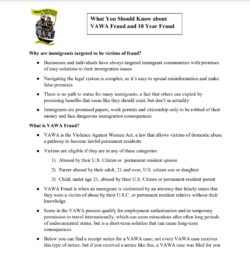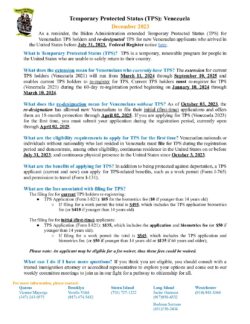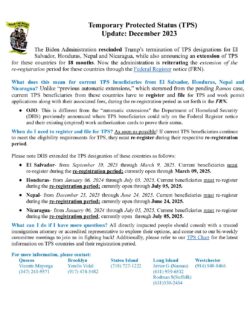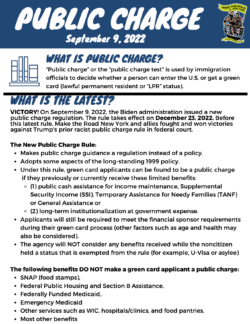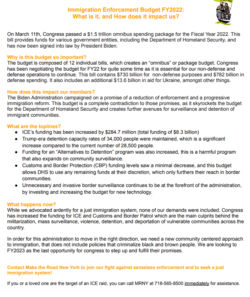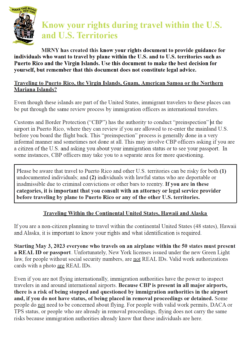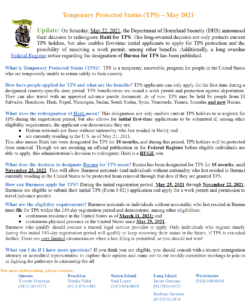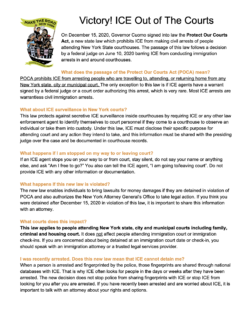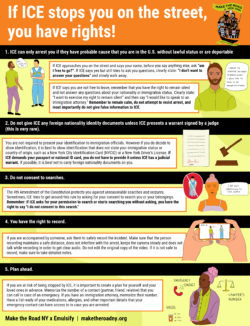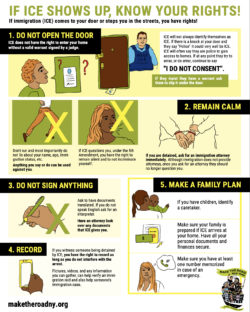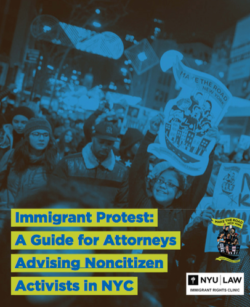IMMIGRATION
RESOURCES IN ENGLISH
The safety of our community members is our top priority. We have compiled a list of resources that our legal and organizing teams have created to ensure our members are prepared for encounters with law enforcement officers.
Please remember that these are supplemental resources and we highly recommend that you reach out to your immigration attorney should you have any questions particular to your case.
NEWSWEEK’S KNOW YOUR RIGHTS VIDEOS
- In any encounter with ICE, you have rights.
- How to prepare if you’re at risk of deportation
- What to do if ICE comes to your home
- What to do if ICE approaches you on the street
What You Should Know about VAWA Fraud and 10 Year Fraud
Why are immigrants targeted to be victims of fraud?
● Businesses and individuals have always targeted immigrant communities with promises
of easy solutions to their immigration issues
● Navigating the legal system is complex, so it’s easy to spread misinformation and make
false promises
● There is no path to status for many immigrants; a fact that others can exploit by
promising benefits that seem like they should exist, but don’t in actuality
● Immigrants are promised papers, work permits and citizenship only to be robbed of their
money and face dangerous immigration consequences
What is VAWA Fraud?
● VAWA is the Violence Against Women Act, a law that allows victims of domestic abuse a pathway to become lawful permanent residents.
● Victims are eligible if they are in any of these categories:
1) Abused by their U.S. Citizen or permanent resident spouse
2) Parent abused by their adult, 21 and over, U.S. citizen son or daughter
3) Child, under age 21, abused by their U.S. Citizen or permanent resident parent
USCIS Fee Increases and Changes
 USCIS recently announced it will be increasing fees for certain immigration applications starting on April 1, 2024. Here is what you need to know!
USCIS recently announced it will be increasing fees for certain immigration applications starting on April 1, 2024. Here is what you need to know!
What is happening to USCIS Fees?
- USCIS has issued a Final rule to raise certain application fees. The rule is scheduled to take effect on April 1, 2024.
- Some fees will stay the same or be decreased but most will be increased.
See our chart explaining some of the common applications. Please note for some applications, the fee will decrease.
Why is USCIS making these changes?
USCIS is self funded through application fees, instead of being primarily funded by taxes. That means that if the government shuts down, USCIS can continue running. USCIS claims it lost income during the pandemic, that it needs to hire more staff & keep up with inflation.
Are all USCIS fees increasing?
- No, not all USCIS fees are increasing.
- Humanitarian applications including victims of crime (U visas), victims of trafficking (T visas), & asylum applications will continue to have no fee.
What to Know if You Are applying for Both TPS and Asylum
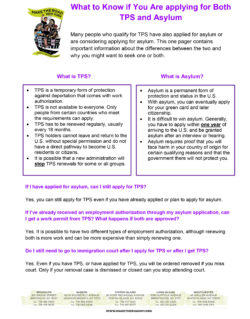 Many people who qualify for TPS have also applied for asylum or are considering applying for asylum. This one pager contains important information about the differences between the two and why you might want to seek one or both.
Many people who qualify for TPS have also applied for asylum or are considering applying for asylum. This one pager contains important information about the differences between the two and why you might want to seek one or both.
What is TPS?
- TPS is a temporary form of protection against deportation that comes with work authorization.
- TPS is not available to everyone. Only people from certain countries who meet the requirements can apply.
- TPS has to be renewed regularly, usually every 18 months.
- TPS holders cannot leave and return to the U.S. without special permission and do not have a direct pathway to become U.S. residents or citizens.
- It is possible that a new administration will stop TPS renewals for some or all groups.
What is Asylum?
- Asylum is a permanent form of protection and status in the U.S.
- With asylum, you can eventually apply for your green card and later citizenship.
- It is difficult to win asylum. Generally, you have to apply within one year of arriving to the U.S. and be granted asylum after an interview or hearing.
- Asylum requires proof that you will face harm in your country of origin for certain qualifying reasons and that the government there will not protect you.
Temporary Protected Status (TPS): Venezuela – December 2023
As a reminder, the Biden Administration extended Temporary Protected Status (TPS) for Venezuelan TPS holders and re-designated TPS for new Venezuelan applicants who arrived in the United States before July 31, 2023. Federal Register notice here.
What is Temporary Protected Status (TPS)?
- TPS is a temporary, renewable program for people in the United States who are unable to safely return to their country.
What does the extension mean for Venezuelans who currently have TPS?
-
The extension for current TPS holders (Venezuela 2021) will run from March 11, 2024 through September 10, 2025 and enables current TPS holders to re-register for TPS. Current TPS holders must re-register for TPS (Venezuela 2021) during the 60-day re-registration period beginning on January 10, 2024 through March 10, 2024.
What does the re-designation mean for Venezuelans without TPS?
-
As of October 03, 2023, the re-designation has allowed new Venezuelans to file their initial (first-time) applications and offers them an 18-month protection through April 02, 2025. If you are applying for TPS (Venezuela 2023) for the first time, you must submit your application during the registration period, currently open through April 02, 2025.
Temporary Protected Status (TPS) Update: December 2023
The Biden Administration rescinded Trump’s termination of TPS designations for El Salvador, Honduras, Nepal and Nicaragua, while also announcing an extension of TPS for these countries for 18 months. Now the administration is reiterating the extension of the re-registration period for these countries through the Federal Register notice (FRN).
What does this mean for current TPS beneficiaries from El Salvador, Honduras, Nepal and Nicaragua?
-
Unlike “previous automatic extensions,” which stemmed from the pending Ramos case, current TPS beneficiaries from these countries have to register and file for TPS and work permit applications along with their associated fees, during the re-registration period as set forth in the FRN.
-
OJO: This is different from the “automatic extensions” the Department of Homeland Security (DHS) previously announced where TPS beneficiaries could rely on the Federal Register notice and their existing (expired) work authorization cards to prove their status.
When do I need to register and file for TPS?
- As soon as possible! If current TPS beneficiaries continue to meet the eligibility requirements for TPS, they must re-register during their respective re-registration period.
Please note DHS extended the TPS designation of these countries as follows:
-
El Salvador- from September 10, 2023 through March 9, 2025. Current beneficiaries must re-register during the re-registration period; currently open through March 09, 2025.
-
Honduras- from January 06, 2024 through July 05, 2025. Current beneficiaries must re-register during the re-registration period; currently open through July 05, 2025.
-
Nepal- from December 25, 2023 through June 24, 2025. Current beneficiaries must re-register during the re-registration period; currently open through June 24, 2025.
-
Nicaragua- from January 06, 2024 through July 05, 2025. Current beneficiaries must re-register during the re-registration period; currently open through July 05, 2025.
- For additional countries, check out our Temporary Protected Status (TPS) Chart here!
UPDATE: DACA UPDATE | SEPTEMBER 2023
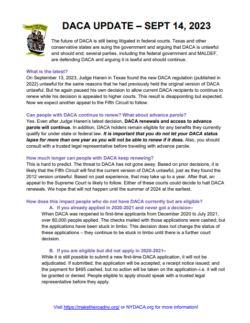 The future of DACA is still being litigated in federal courts. Texas and other
The future of DACA is still being litigated in federal courts. Texas and other
conservative states are suing the government and arguing that DACA is unlawful
and should end; several parties, including the federal government and MALDEF,
are defending DACA and arguing it is lawful and should continue.
What is the latest?
On September 13, 2023, Judge Hanen in Texas found the new DACA regulation (published in
2022) unlawful for the same reasons that he had previously held the original version of DACA
unlawful. But he again paused his own decision to allow current DACA recipients to continue to
renew while his decision is appealed to higher courts. This result is disappointing but expected.
Now we expect another appeal to the Fifth Circuit to follow.
- Can people with DACA continue to renew? What about advance parole?
- How much longer can people with DACA keep renewing?
- How does this impact people who do not have DACA currently but are eligible?
- How does this impact young people who don’t meet the requirements for DACA?
UPDATE: HUMANITARIAN PAROLE FOR PEOPLE LIVING ABROAD | JULY 2023
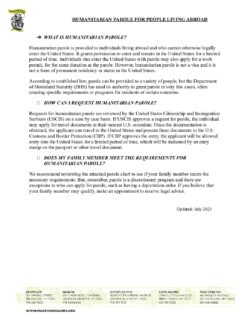 Humanitarian parole is provided to individuals living abroad and who cannot otherwise legally
Humanitarian parole is provided to individuals living abroad and who cannot otherwise legally
enter the United States. It grants permission to enter and remain in the United States for a limited
period of time. Individuals that enter the United States with parole may also apply for a work
permit, for the same duration as the parole. However, humanitarian parole is not a visa and it is
not a form of permanent residency or status in the United States.
According to established law, parole can be provided to a variety of people, but the Department
of Homeland Security (DHS) has used its authority to grant parole in very few cases, often
creating specific requirements or programs for residents of certain countries.
- What is Humanitarian Parole?
- How can I request a Humanitarian Parole?
- Does my family member meet the requirements for Humanitarian Parole?
DOWNLOAD HUMANITARIAN PAROLE UPDATE
UPDATE: TEMPORARY PROTECTED STATUS (TPS) | JUNE 2023
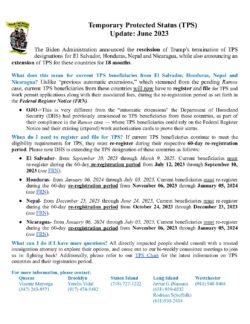 The Department of Homeland Security (“DHS”) announced a new process that permits workers involved in labor investigations to petition for deferred action and, ultimately, a temporary work authorization.
The Department of Homeland Security (“DHS”) announced a new process that permits workers involved in labor investigations to petition for deferred action and, ultimately, a temporary work authorization.
What does this mean for current TPS beneficiaries from El Salvador, Honduras, Nepal, and Nicaragua? Unlike “previous automatic extensions,” which stemmed from the pending Ramos case, current TPS beneficiaries from these countries will now have to register and file for TPS and work permit applications along with their associated fees, during the re-registration period as set forth in the Federal Register Notice (FRN).
● OJO->This is very different from the “automatic extensions” the Department of Homeland Security (DHS) had previously announced to TPS beneficiaries from these countries, as part of their compliance in the Ramos case — where TPS beneficiaries could rely on the Federal Register Notice and their existing (expired) work authorization cards to prove their status.
DHS UPDATE: DEFERRED ACTION FOR WORKERS | FEBRUARY 2023
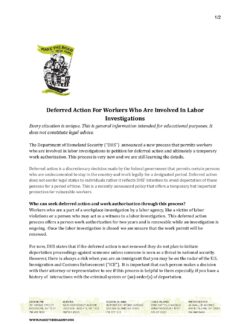 The Department of Homeland Security (“DHS”) announced a new process that permits workers involved in labor investigations to petition for deferred action and, ultimately, a temporary work authorization.
The Department of Homeland Security (“DHS”) announced a new process that permits workers involved in labor investigations to petition for deferred action and, ultimately, a temporary work authorization.
Deferred action is a discretionary decision made by the federal government that permits certain undocumented persons to stay in the country and work legally for a designated period of time.
Deferred action does not grant legal status.
- Who can seek deferred action and work authorization through this process?
- What is the process for seeking deferred action?
- What happens if there is a lawsuit against DHS regarding this new process?
- Is Make the Road New York assisting persons in obtaining deferred action through this process?
- What should I do if I have a pending claim before a labor agency or if I want to submit a complaint to a labor agency?
DACA UPDATE | OCTOBER 2022
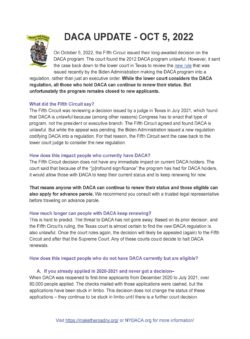 On October 5, 2022, the Fifth Circuit issued their long-awaited decision on the DACA program. The court found the 2012 DACA program unlawful. However, it sent the case back down to the lower court in Texas to review the new rule that was issued recently by the Biden Administration making the DACA program into a regulation, rather than just an executive order. While the lower court considers the DACA regulation, all those who hold DACA can continue to renew their status. But unfortunately the program remains closed to new applicants.
On October 5, 2022, the Fifth Circuit issued their long-awaited decision on the DACA program. The court found the 2012 DACA program unlawful. However, it sent the case back down to the lower court in Texas to review the new rule that was issued recently by the Biden Administration making the DACA program into a regulation, rather than just an executive order. While the lower court considers the DACA regulation, all those who hold DACA can continue to renew their status. But unfortunately the program remains closed to new applicants.
- What did the Fifth Circuit say?
- How does this impact people who currently have DACA?
- How much longer can people with DACA keep renewing?
- How does this impact people who do not have DACA currently but are eligible?
- How does this impact young people who don’t meet the requirements?
- Could any of this change?
For the most up-to-date information, stay tuned at nydaca.org.
PUBLIC CHARGE UPDATE | SEPTEMBER 2022
“Public charge” or the “public charge test” is used by immigration officials to decide whether a person can enter the U.S. or get a green card (lawful permanent resident or “LPR” status).
What is the latest?
VICTORY! On September 9, 2022, the Biden administration issued a new public charge regulation. The rule takes effect on December 23, 2022. Before this latest rule, Make the Road New York and allies fought and won victories against Trump’s prior racist public charge rule in federal court.
What should I do?
You can and should access any benefits you or your family qualify for without fear (SNAP, housing, health insurance, healthcare, etc.)
If you have a question about your eligibility for a green card, talk to an immigration attorney or accredited representative (For NYC residents, you can call 311 for an Action NYC appointment, outside NY, call ONA at 1-800-566-7636)
If you want to enroll or renew health or SNAP benefits, contact the Make the Road health team at 866-365-2724
TPS UPDATE: VENEZUELA | SEPTEMBER 2022
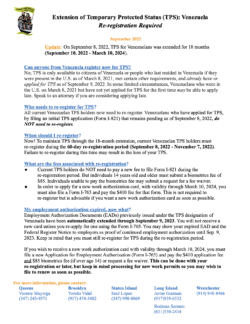 On September 8, 2022, TPS for Venezuelans was extended for 18 months (September 10, 2022 – March 10, 2024).
On September 8, 2022, TPS for Venezuelans was extended for 18 months (September 10, 2022 – March 10, 2024).
Can anyone from Venezuela register now for TPS?
No; TPS is only available to citizens of Venezuela or people who last resided in Venezuela if they were present in the U.S. as of March 8, 2021, met certain other requirements, and already have or applied for TPS as of September 9, 2022. In some limited circumstances, Venezuelans who were in the U.S. on March 8, 2021 but have not yet applied for TPS for the first time may be able to apply late. Speak to an attorney if you are considering applying late.
Who needs to re-register for TPS?
All current Venezuelan TPS holders now need to re-register. Venezuelans who have applied for TPS, by filing an initial TPS application (Form I-821) that remains pending as of September 8, 2022, do NOT need to re-register.
When should I re-register?
Now! To maintain TPS through the 18-month extension, current Venezuelan TPS holders must re-register during the 60-day re-registration period (September 8, 2022 – November 7, 2022). Failure to re-register during this time may result in the loss of your TPS.
*NEW* DEPORTATION DEFENSE MANUAL | AUGUST 2022
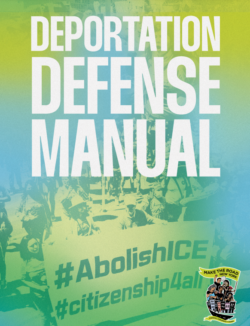 The purpose of this manual is to provide information, resources and a guide to create a plan of action to protect targeted communities against hyper enforcement perpetuated by ICE (“la Migra”).
The purpose of this manual is to provide information, resources and a guide to create a plan of action to protect targeted communities against hyper enforcement perpetuated by ICE (“la Migra”).
It is important to remember when we act together, we have the power to protect one another even when immigration laws and agents do not respect our community. This manual contains three different sections that address: (1) your rights when dealing with the U.S. Immigration and Customs Enforcement (ICE) and how to get prepared; (2) steps to take and information to know when supporting an individual or family after an ICE raid, and (3) strategies for organization around an individual case in your community.
The first part, “Know Your Rights” will focus on your rights at home and in public spaces when interacting with ICE agents. This section also includes information and resources on how to prepare yourself in case you, or a family member, is detained by ICE. Second, “Rapid Response to Raids” is a guide on how to support someone who has been detained. This includes information on how to locate a person, how to visit them, how to ensure their loved ones know what steps to take, and how to assess options for legal representation. Lastly, “Deportation Defense” will focus on how to fight deportation cases through organizing and community participation, how to organize a campaign, fundraise and how to become involved in the movement to end the separation of our families.
This manual is a resource for individuals who are being impacted by the escalation of immigration enforcement activity, and for individuals who are interested in becoming a support person for those affected. However, this is a supplement to, not a substitute for, legal counsel. If you are facing deportation or have a previous deportation order, you should reach out to an immigration attorney.
DOWNLOAD OUR DEPORTATION DEFENSE MANUAL
THE STOP IMMIGRANT BOND ABUSE ACT PASSED! | JUNE 2022
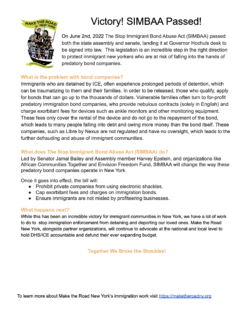 On June 2nd, 2022 The Stop Immigrant Bond Abuse Act (SIMBAA) passed both the state assembly and senate, landing it at Governor Hochuls desk to be signed into law. This legislation is an incredible step in the right direction to protect immigrant new yorkers who are at risk of falling into the hands of predatory bond companies.
On June 2nd, 2022 The Stop Immigrant Bond Abuse Act (SIMBAA) passed both the state assembly and senate, landing it at Governor Hochuls desk to be signed into law. This legislation is an incredible step in the right direction to protect immigrant new yorkers who are at risk of falling into the hands of predatory bond companies.
What is the problem with bond companies?
Immigrants who are detained by ICE, often experience prolonged periods of detention, which can be traumatizing to them and their families. In order to be released, those who qualify, apply for bonds that can go up to the thousands of dollars. Vulnerable families often turn to for-profit predatory immigration bond companies, who provide nebulous contracts (solely in English) and charge exorbitant fees for devices such as ankle monitors and other monitoring equipment. These fees only cover the rental of the device and do not go to the repayment of the bond, which leads to many people falling into debt and owing more money than the bond itself. These companies, such as Libre by Nexus are not regulated and have no oversight, which leads to the further defrauding and abuse of immigrant communities.
What does The Stop Immigrant Bond Abuse Act (SIMBAA) do?
Led by Senator Jamal Bailey and Assembly member Harvey Epstein, and organizations like African Communities Together and Envision Freedom Fund, SIMBAA will change the way these predatory bond companies operate in New York.
Once it goes into effect, the bill will:
● Prohibit private companies from using electronic shackles.
● Cap exorbitant fees and charges on immigration bonds.
● Ensure immigrants are not misled by profiteering businesses.
TITLE 42 | MAY 2022
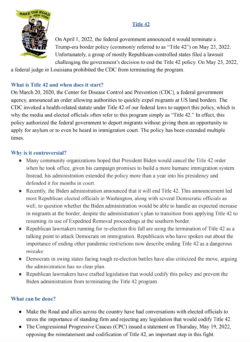 On April 1, 2022, the federal government announced it would terminate a Trump-era border policy (commonly referred to as “Title 42”) on May 23, 2022. Unfortunately, a group of mostly Republican-controlled states filed a lawsuit challenging the government’s decision to end the Title 42 policy. On May 23, 2022, a federal judge in Louisiana prohibited the CDC from terminating the program.
On April 1, 2022, the federal government announced it would terminate a Trump-era border policy (commonly referred to as “Title 42”) on May 23, 2022. Unfortunately, a group of mostly Republican-controlled states filed a lawsuit challenging the government’s decision to end the Title 42 policy. On May 23, 2022, a federal judge in Louisiana prohibited the CDC from terminating the program.
What is Title 42 and when does it start?
On March 20, 2020, the Center for Disease Control and Prevention (CDC), a federal government agency, announced an order allowing authorities to quickly expel migrants at US land borders. The CDC invoked a health-related statute under Title 42 of our federal laws to support this policy, which is why the media and elected officials often refer to this program simply as “Title 42.” In effect, this policy authorized the federal government to deport migrants without giving them an opportunity to apply for asylum or to even be heard in immigration court. The policy has been extended multiple times.
IMMIGRATION ENFORCEMENT FY 22 BUDGET
On March 11th, Congress passed a $1.5 trillion omnibus spending package for the Fiscal Year 2022. This bill provides funds for various government entities, including the Department of Homeland Security, and has now been signed into law by President Biden.
Why is this budget so important?
The budget is composed of 12 individual bills, which creates an “omnibus” or package budget. Congress has been negotiating the budget for FY22 for quite some time as it is essential for our non-defense and defense operations to continue. This bill contains $730 billion for non-defense purposes and $782 billion in defense spending. It also includes an additional $13.6 billion in aid for Ukraine, amongst other things.
2022 immigration enforcement one-pager
TRAVELING WITHIN THE U.S. AND THE U.S. TERRITORIES
Customs and Border Protection (“CBP”) has the authority to conduct “preinspection” at the airport in Puerto Rico and other U.S. territories, where they can review if you are allowed to re-enter the mainland U.S. before you board the flight back. This “preinspection” process is generally done in a very informal manner and sometimes not done at all.
This may involve CBP officers asking if you are a citizen of the U.S. and asking you about your immigration status or to see your passport. In some instances, CBP officers may take you to a separate area for more questioning. Please be aware that travel to Puerto Rico and other U.S. territories can be risky for both (1) undocumented individuals; and (2) individuals with lawful status who are deportable or inadmissible due to criminal convictions or other bars to reentry. If you are in these categories, it is important that you consult with an attorney or legal service provider before traveling by plane to Puerto Rico or any of the other U.S. territories.
TEMPORARY PROTECTED STATUS (TPS) | SEPTEMBER 2021
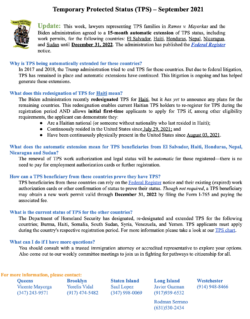 This week, lawyers representing TPS families in Ramos v. Mayorkas and the Biden administration agreed to a 15-month automatic extension of TPS status, including work permits, for the following countries: El Salvador, Haiti, Honduras, Nepal, Nicaragua, and Sudan until December 31, 2022. The administration has published the Federal Register notice.
This week, lawyers representing TPS families in Ramos v. Mayorkas and the Biden administration agreed to a 15-month automatic extension of TPS status, including work permits, for the following countries: El Salvador, Haiti, Honduras, Nepal, Nicaragua, and Sudan until December 31, 2022. The administration has published the Federal Register notice.
Why is TPS being automatically extended for these countries?
In 2017 and 2018, the Trump administration tried to end TPS for these countries. But due to federal litigation, TPS has remained in place and automatic extensions have continued. This litigation is ongoing and has helped generate these extensions.
What does this redesignation of TPS for Haiti mean?
The Biden administration recently redesignated TPS for Haiti, but it has yet to announce any plans for the remaining countries. This redesignation enables current Haitian TPS holders to re-register for TPS during the registration period AND allows initial first-time applicants to apply for TPS if, among other eligibility requirements, the applicant can demonstrate they:
- Are a Haitian national (or someone without nationality who last resided in Haiti);
- Continuously resided in the United States since July 29, 2021; and
- Have been continuously physically present in the United States since August 03, 2021.
-
Download our most recent TPS update.
TEMPORARY PROTECTED STATUS (TPS): Haiti | AUGUST 2021
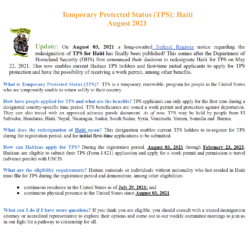 On August 03, 2021 a long-awaited Federal Register notice regarding the redesignation of TPS for Haiti has finally been published! This comes after the Department of Homeland Security (DHS) first announced their decision to redesignate Haiti for TPS on May 22, 2021. This now enables current Haitian TPS holders and first-time initial applicants to apply for TPS protection and have the possibility of receiving a work permit, among other benefits.
On August 03, 2021 a long-awaited Federal Register notice regarding the redesignation of TPS for Haiti has finally been published! This comes after the Department of Homeland Security (DHS) first announced their decision to redesignate Haiti for TPS on May 22, 2021. This now enables current Haitian TPS holders and first-time initial applicants to apply for TPS protection and have the possibility of receiving a work permit, among other benefits.
What is Temporary Protected Status (TPS)?
TPS is a temporary, renewable, program for people in the United States who are temporarily unable to return safely to their country.
How have people applied for TPS and what are the benefits?
TPS applicants can only apply for the first time during a designated country-specific time period. TPS beneficiaries are issued a work permit and protection against deportation.
They can also travel with an approved advance parole document. As of now, TPS may be held by people from El Salvador, Honduras, Haiti, Nepal, Nicaragua, Sudan, South Sudan, Syria, Venezuela, Yemen, Somalia and Burma.
TEMPORARY PROTECTED STATUS (TPS): El Salvador | JUNE 2021
 On April 19, 2021 the Supreme Court of the United States (SCOTUS) heard arguments in Sanchez v. Mayorkas, a case involving a TPS recipient from El Salvador. This past Monday, in a unanimous decision (9-0), the court found that Mr. Sanchez, who has held TPS since 2001, cannot apply for his green card while in the U.S. because he first “entered without inspection.” Mr. Sanchez had argued that because he has TPS, he should be treated like he was admitted to the U.S.–the same way some people are admitted if they arrived in the U.S. on a visa– and so can adjust status here. This disappointing decision is a loud reminder that our fight for legislative and permanent solutions is critical now more than ever for our immigrant communities.
On April 19, 2021 the Supreme Court of the United States (SCOTUS) heard arguments in Sanchez v. Mayorkas, a case involving a TPS recipient from El Salvador. This past Monday, in a unanimous decision (9-0), the court found that Mr. Sanchez, who has held TPS since 2001, cannot apply for his green card while in the U.S. because he first “entered without inspection.” Mr. Sanchez had argued that because he has TPS, he should be treated like he was admitted to the U.S.–the same way some people are admitted if they arrived in the U.S. on a visa– and so can adjust status here. This disappointing decision is a loud reminder that our fight for legislative and permanent solutions is critical now more than ever for our immigrant communities.
What is Temporary Protected Status (TPS)?
TPS is a temporary, renewable, program for people in the United States who are temporarily unable to return safely to their country. The Secretary of Homeland Security has the authority, in consultation with other governmental agencies, to designate a country for TPS for periods of 6 to 18 months and to extend these periods.
TEMPORARY PROTECTED STATUS (TPS): HAITI – MAY 2021
Update: On Saturday, May 22, 2021, the Department of Homeland Security (DHS) announced their decision to redesignate Haiti for TPS. This long-awaited decision not only protects current TPS holders, but also enables first-time initial applicants to apply for TPS protection and the possibility of receiving a work permit, among other benefits. Additionally, a long overdue Federal Register notice regarding the designation of Burma for TPS has been published.
What is Temporary Protected Status (TPS)?
TPS is a temporary, renewable, program for people in the United States who are temporarily unable to return safely to their country.
How have people applied for TPS and what are the benefits?
TPS applicants can only apply for the first time during a designated country-specific time period. TPS beneficiaries are issued a work permit and protection against deportation. They can also travel with an approved advance parole document. As of now, TPS may be held by people from El Salvador, Honduras, Haiti, Nepal, Nicaragua, Sudan, South Sudan, Syria, Venezuela, Yemen, Somalia and now Burma.
EXECUTIVE ORDERS: DACA, DED, MUSLIN AND AFRICAN BANS, CENSUS, AND BORDER CHANGES
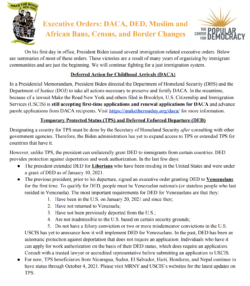 On his first day in office, President Biden issued several immigration-related executive orders. Below are summaries of most of these orders. These victories are a result of many years of organizing by immigrant communities and are just the beginning. We will continue fighting for a just immigration system.
On his first day in office, President Biden issued several immigration-related executive orders. Below are summaries of most of these orders. These victories are a result of many years of organizing by immigrant communities and are just the beginning. We will continue fighting for a just immigration system.
Deferred Action for Childhood Arrivals (DACA)
In a Presidential Memorandum, President Biden directed the Department of Homeland Security (DHS) and the Department of Justice (DOJ) to take all actions necessary to preserve and fortify DACA. In the meantime, because of a lawsuit Make the Road New York and others filed in Brooklyn, U.S. Citizenship and Immigration Services (USCIS) is still accepting first-time applications and renewal applications for DACA and advance parole applications from DACA recipients. Visit our portal here for more information.
Temporary Protected Status (TPS) and Deferred Enforced Departure (DED)
Designating a country for TPS must be done by the Secretary of Homeland Security after consulting with other government agencies. Therefore, the Biden administration has yet to expand access to TPS or extended TPS for countries that have it.
ICE OUT OF COURTS
On December 15, 2020, Governor Cuomo signed into law the Protect Our Courts Act (POCA), a new state law which prohibits ICE from making civil arrests of people attending New York State courthouses. The passage of this law follows a decision by a federal judge on June 10, 2020 barring ICE from conducting immigration arrests in and around courthouses.
What does the passage of the Protect Our Courts Act (POCA) mean?
POCA prohibits ICE from arresting people who are traveling to, attending, or returning home from any New York State, city or municipal court. The only exception to this law is if ICE agents have a warrant signed by a federal judge or a court order authorizing this arrest, which is very rare. Most ICE arrests are warrantless civil immigration needs.
What about ICE surveillance in New York courts?
This law protects against secretive ICE surveillance inside courthouses by requiring ICE or any other law enforcement agent to identify themselves to court personnel if they come to a courthouse to observe an individual or take them into custody. Under this law, ICE must disclose their specific purpose for attending court and any action they intend to take, and this information must be shared with the presiding judge over the case and be documented in courthouse records.
ICE AND THE WORKPLACE
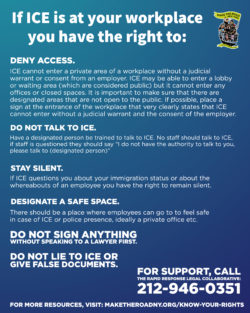
If ICE shows up at your workplace, you have the right to:
- Deny access;
ICE cannot enter a private area of a workplace without a judicial warrant or consent from an employer. ICE may be able to enter a lobby or waiting area (which are considered public) but it cannot enter any offices or closed spaces. It is important to make sure that there are designated areas that are not open to the public. If possible, place a sign at the entrance of the workplace that very clearly states that ICE cannot enter without a judicial warrant and the consent of the employer.
- Do not talk to ICE;
Have a designated staff should talk to ICE, if staff is questioned, they should say “I do not have the authority to you, please talk to (designated person)”
- Remain silent;
If ICE questions you about your immigration status or about the whereabouts of an employee you have the right to remain silent.
- Designate a safe space;
There should be a place where employees can go to to feel safe in case of ICE or police presence, ideally a private office etc.
DO NOT SIGN ANYTHING WITHOUT SPEAKING TO YOUR LAWYER. DO NOT GIVE ANY FALSE INFORMATION TO ICE.
USCIS FEE INCREASE & FEE WAIVER CHANGES
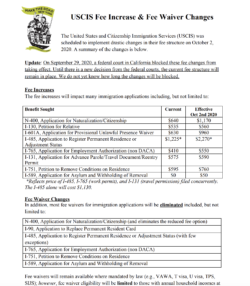 The United States and Citizenship Immigration Services (USCIS) was scheduled to implement drastic changes in their fee structure on October 2, 2020.
The United States and Citizenship Immigration Services (USCIS) was scheduled to implement drastic changes in their fee structure on October 2, 2020.
Update: On September 29, 2020, a federal court in California blocked these fee changes from taking effect. Until there is a new decision from the federal courts, the current fee structure will remain in place. We do not yet know how long the changes will be blocked.
When will this happen?
The fee changes were scheduled to take effect October 2, 2020. A federal court has currently blocked the implementation of the fee changes. We do not yet know if and when the fee changes will take effect.
Who is impacted?
These changes will most heavily impact citizenship and family-based applications and is another devastating attack on low-income immigrants by the current administration. The fee increases and elimination of fee waivers will discourage people from becoming citizens and in turn having the power to vote and participate more fully in society. The elimination of the fee waivers will prevent immigrants from keeping their work permits current. Moreover, the fee increases will make it more difficult for immigrant families to unite or remain together.
IF ICE STOPS YOU ON THE STREET, YOU HAVE RIGHTS!
- ICE can only arrest you if they have probably cause that you are in the U.S. without lawful status or are deportable.
- Do not give ICE any foreign nationality identity documents unless ICE presents a warrant signed by a judge (this is very rare).
- Do not consent to searches.
- You have the right to record.
- Plan ahead.
If you are at risk of being stopped by ICE, it is important to create a plan for yourself and your loved ones in advance. Memorize the number of a ontact (partner, friend, relative) that you can call in case of an emergency. If you have an immigration attorney, memorize their number. Have a list ready of your medicatitons, allergies, and other important details that your emergency contact can have access to in case you are arrested.
IMMIGRANT PROTESTORS IN NYC
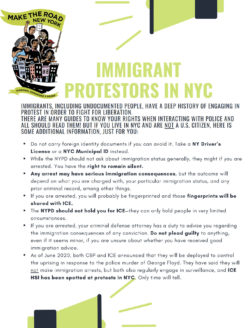 Immigrants, including undocumented people, have a deep history of engaging in protest in order to fight for liberation. There are many guides to know your rights when interacting with police and all should read them! But if you live in NYC and are NOT a U.S. citizen, here is some additional information, just for you:
Immigrants, including undocumented people, have a deep history of engaging in protest in order to fight for liberation. There are many guides to know your rights when interacting with police and all should read them! But if you live in NYC and are NOT a U.S. citizen, here is some additional information, just for you:
- Do not carry foreign identity documents if you can avoid it. Take a NY Driver’s License or a NYC Municipal ID instead.
- While the NYPD should not ask about immigration status generally, they might if you are arrested. You have the right to remain silent.
- Any arrest may have serious immigration consequences, but the outcome will depend on what you are charged with, your particular immigration status, and any prior criminal record, among other things.
- If you are arrested, you will probably be finger-pointed and those fingerprints will be shared with ICE.
- The NYPD should not hold you for ICE – they can only hold people in very limited circumstances.
- If you are arrested, your criminal defense attorney has a duty to advise you regarding the immigration consequences of any conviction. Do not plead guilty to anything, even if it seems minor, if you are unsure about whether you have received good immigration advice.
- As of June 2020, both CBP and ICE announced that they will be deployed to control the uprising in response to the police murder of George Floyd. They have said they will not make immigration arrests, but both also regularly engage in surveillance, and ICE HSI has been spotted at protests in NYC. Only time will tell.
-
Download our one-pager guide here for undocumented protestors in NYS.
DO I HAVE THE RIGHT TO FILM?
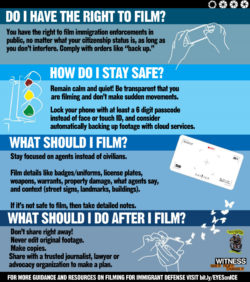
You have the right to film immigration enforcements in public, no matter what your citizenship status is, as long as you don’t interfere. Comply with orders like “back up.”
How do I stay safe?
Remain calm and quiet! Be transparent that you are filming and don’t make sudden movements.
Lock your phone with at least a 6 digit passcode instead of face or touch ID, and consider automatically backing up footage with cloud services.
What should I film?
Stay focused on agents instead of civilians.
Film details like badges/uniforms, license plates, weapons, warrants, property damage, what agents say, and context (street signs, landmarks, buildings).
What should I film?
Don’t share right away!
-
For more information, download our infographic here and visit here for more guidance and resources on filming for immigrant defense.
IF ICE SHOWS UP, KNOW YOUR RIGHTS!
- Do NOT open the door.
- Remain calm.
- Do not sign anything.
- Make a family plan.
- Record.
IMMIGRANT PROTEST: A Guide for Attorneys Advising Noncitizen Activists in NYC
Actions are a powerful tool to build community, demonstrate power through a show of numbers, and bring attention to demands. However, engagement in protest often comes with personal risk, including for non-citizens who could face immigration enforcement as a result of contact with local law enforcement. Lawyers providing guidance to non-citizens often overgeneralize through statements such as “all action participation is dangerous,” which can feel disempowering to non-citizens who may want to engage in protest and is disrespectful to the long history of immigrant, including undocumented, activism. Through this project, we seek to assist attorneys in providing more detailed advice so that non-citizens can make informed choices about whether the reward is worth the risk.

